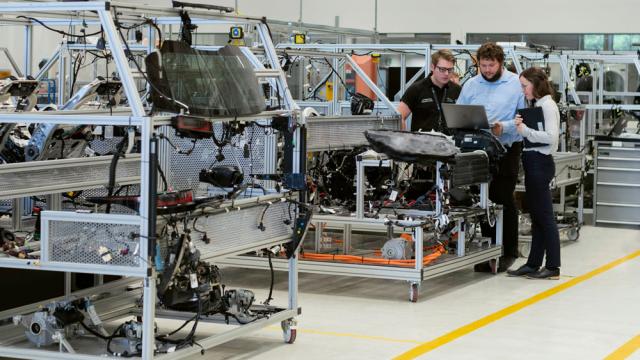All Features

Akhilesh Gulati
In the world of quality and lean, waste is the enemy. We hunt for it in cycle times, inventory buffers, and defects. But occasionally we encounter a form of waste so massive and literal that we fail to see it as a resource.
A recent redevelopment project at Denver’s National Western Center (NWC)…

Quality Digest, Steve Ilmrud
Maintaining a skilled team from the bottom up is essential. But as skilled workers retire and take their knowledge with them, we rely more on a clear understanding of how digital and AI tools may be reshaping our approach to manufacturing quality, supply chains, and building a team. To provide some…

ISO
Data are the backbone of our digital world. From healthcare to finance, and from government agencies to private businesses, organizations everywhere rely on vast amounts of data to function effectively.
It’s not just businesses that generate data. We all leave digital trails through our…

Ram Sriram
When you go to a medical appointment, does the doctor look at you while you talk? Or are they busy typing everything you say into a computer? If it’s the latter, you may find that will change soon, thanks to artificial intelligence.
Some doctors’ offices are using AI services to transcribe your…

Josh Peterson
As AI makes its way into every corner of work, quality management is no exception. That isn’t surprising: Quality teams are buried in documentation, training upkeep, investigations, and reporting, which are exactly the kinds of workflows AI can help streamline.
However, in regulated environments…

Susan Robertson
In some organizations, possibility feels like a luxury. Something you talk about at offsite sessions. Something you reference in mission statements. Something you save for after the real work is done.
But in visionary organizations, possibility is the work.
Visionary leaders understand that…

Peter Chhim
During the last couple of decades working in quality, I’ve lost count of how many times I’ve seen the same pattern play out: A strong launch. Tight focus. Great early results. People doing the right things for the right reasons. Controls are followed. Issues are surfaced quickly. Leaders are…

Dania Akram
Modern industrial and infrastructure environments are becoming larger, more complex, and more geographically dispersed. As facilities expand, internal audit teams face increasing pressure to deliver accurate, defensible findings within limited time frames. Traditional audit methods—largely…

Gleb Tsipursky
The future of flexible work will not be decided by floor plans or badge swipes. It will be decided by who gets to build the tools.
Fresh evidence from a new global survey shows the shift in plain numbers. GoTo and Workplace Intelligence asked 2,500 people across roles and countries about AI and…

Bryan Christiansen
You finished the plan, you executed the work, and you know your team delivered results. But when it’s time to prove your budget request or show value to leadership, you struggle to give clear proof.
Maintenance teams can have a tough time transitioning from “doing work” to “reporting value.” The…

Joe Curcillo
Most leaders you meet are losing almost a full workday every week to meetings that go nowhere. Same people. Same topics. Same problems. No real movement.
You’ve seen it in boardrooms and job trailers: different settings, but the same pattern. The problem isn’t meetings; it’s that your meetings are…

Kate Zabriskie
Something goes sideways at work—missed deadlines, bad customer feedback, you name it—and the first suggestion is, “We need training!” Sound familiar? It’s like reaching for a Band-Aid when what you really need is a lifestyle change. Training can be powerful, but it shouldn’t be your knee-jerk…

Angie Basiouny
A missed birthday. A forgotten anniversary. A milestone that goes unnoticed. These small slights from a manager may seem like no big deal, but new research from Wharton reveals that even the mildest mistreatment at work can affect more than just employee morale.
The study found that when managers…

Jen Chang
Increasingly, inspectors for the U.S. Food and Drug Administration (FDA) will evaluate your CMMS provider’s security controls—not just your internal procedures. In a cloud-hosted GxP environment, data doesn’t stop at your firewall; your vendor’s security posture becomes part of your compliance…

Kathryn Wagner
In today’s energy sector, regulatory complexity isn’t a temporary headache—it’s the new normal. Utilities face an accelerating torrent of mandates from multiple levels of government. This includes FERC reliability standards, EPA emissions rules, state-level renewable portfolio standards, …

CANEA
The digitalization of society during the last decade has created many opportunities for businesses and organizations. But digitalization, combined with a rapidly changing world, has also opened new threats and vulnerabilities that can cause serious damage to businesses. Every day we see headlines…

Chris Pinaire
The manufacturing industry is undergoing a transformation driven by rapid technological advancements, changing consumer preferences, and evolving regulatory frameworks. Manufacturers everywhere face unprecedented challenges as they seek to remain competitive, profitable, and sustainable in the face…

Ken Eme
When I first became involved in lean (continuous improvement), I was the VP of operations at a privately held company in the Midwest. It was 2003, and as a newly promoted senior executive I was eager to find a strategy that could make a real difference in our operations.
I quickly realized that…

Harish Jose
In this article I want to spend time with Søren Kierkegaard. I’ve been interested in his ideas because he occupies an unusual place in the history of thought. He’s considered a pioneer of existentialism, and yet he was also a man of faith.
Most of the existentialist thinkers who followed him,…

Mike King
As we look ahead to 2026, the medtech sector stands at an intersection of regulatory evolution, technological advancement, and operational transformation.
The landscape for quality and regulatory affairs (QARA) professionals continues to shift, driven by emerging AI capabilities, changing…

Melanie Morales
In modern manufacturing, the smartest factories know that safety comes first. Any injury, equipment problem, or unexpected stop can slow everything down.
The good news? The right equipment updates can reduce many of these risks. From tool balance systems to better cable management, the right…

Gleb Tsipursky
The demos look slick, the promises even slicker. In slides and keynotes, agentic assistants plan, click, and ship your work while you sip coffee. Promoters like McKinsey call it the agentic AI advantage.
Then you put these systems on real client work and the wheels come off. The newest empirical…

Dan Steele
For years, manufacturers have been told the future of Industry 4.0 lives in the cloud. Vendors promised plug-and-play AI that could analyze everything, automate anything, and transform the factory floor overnight. In theory, this appears to work, but operationalizing cloud-based AI isn’t always…

Maartje van Krieken
Performance rarely collapses with fanfare. More often, it flatlines quietly; sales soften, productivity slows, priorities blur, and yet teams run hard without moving the needle. In 2025, the RSM U.S. Middle Market Business Index slid from the low 140s into the low 120s in a short period, with fewer…

Bennie Caldwell
In manufacturing, failure isn’t an option—it’s a liability. A defective part or a missed delivery triggers a chain reaction that can disrupt schedules, undermine trust, and drain resources.
So when someone suggests a strategy with the word fail in it, skepticism is understandable, because…